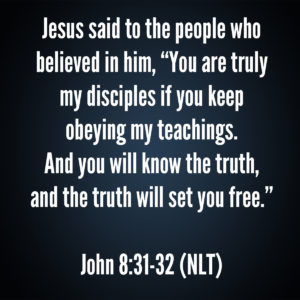Can You Trust God In The Darkness?
 If you have lived for any length of time as a true follower of God you will encounter periods in life when it seems your sense of God and his will are gone or at least obscured. These times can be caused by our own doing if we have drifted away from God but they can also come because God is removing his presence, or at least the awareness of his presence, to develop our inner self because the heart is so easily fooled and so easily twisted.
If you have lived for any length of time as a true follower of God you will encounter periods in life when it seems your sense of God and his will are gone or at least obscured. These times can be caused by our own doing if we have drifted away from God but they can also come because God is removing his presence, or at least the awareness of his presence, to develop our inner self because the heart is so easily fooled and so easily twisted.
David wrote about such a time when the Lord had delivered him from all his enemies, including King Saul. He wrote a psalm to commemorate the occasion and what he was feeling so that we might gain insight into his journey in life and choose to make similar choices by trusting God in bad times. David said that God “Illuminated” his darkness, which implies that, at times, he was walking in the dark in terms of sensing God’s presence and his favor.
2 Samuel 22:29
“For You are my lamp, O LORD; And the LORD illumines my darkness.
Again, in the Psalms themselves, he wrote a similar thing. He added that God was his light or lamb and that God inspired him with insight within the dark time of his life and thus revealed what he should do during such a time of despair.
Psalms 18:28
For You light my lamp; The LORD my God illumines my darkness.
I can remember wondering during my early years as a believer if God would be my guide, even when trials came my way. I contemplated if God would be as real when I am old as when I am young.
I used to read books from the 1800s because, although I found them hard to read with the style of language they used, I found they had far deeper insight than most of the modern ones. One such book was the “Darkness of the Soul” by St. John of the Cross. He was a 16th century Spanish priest who wrote a poem about a spiritual crisis of faith, described as a “dark night” in which light can only be found within the soul. It was later titled, “The Dark Night of the Soul,” an expression that became common among theologians to describe spiritual depression and angst.
This book has been embraced by both Catholic and Protestant believers because of its profound insight and honesty. The “dark night of the soul” refers to a period of spiritual distress characterized by a sense of abandonment, doubt, and even despair. The individual feels a profound absence of God’s presence or guidance. It’s not a sign of failing faith, but rather a process of purification and deepening spiritual connection with God. Mind you, in my view, this period of darkness can come about because of failure to walk in the wisdom of God’s word as well as God specifically trying to wean us off of living by sight and not by faith. Admittedly, this is something that I still struggle with after walking with the Lord for 55 years as a believer.
David writes later in the psalms about God arising while he was in darkness and that he then experienced God’s grace and compassion in a unique way. I think we read verses like this and have no idea the background story David is speaking from, which brings context to its meaning. If we understand that David was anointed as king of Israel and then spent the next 14 years on the run from King Saul it makes a profound difference to this psalm and others like it. David’s darkness could have gone on for years rather that days, as is the case for most of us.
Psalms 112:4
Light arises in the darkness for the upright;
He is gracious and compassionate and righteous.
In the book of Jonah, we see a similar time for the prophet because he refused to do as the Lord directed him. Jonah finds himself in great despair even though he knew something like this was bound to happen to him because he was disobedient to God. It is one thing to know a dark time is coming and quite another to be in the thick of such a time. Jonah is in such distress that he cries out to God
Jonah 2:2
He said, “I called out in my distress to the LORD,
And He answered me. I cried for help from the depth of Sheol; You heard my voice.
This sounds like a “I am in the depth of Hell” prayer. There may be times in our lives when it feels like we are in a similar place and out of agony we are willing to do anything to get it over with. Jonah was willing to compromise his stubborn will to the will of God only because of the dark hell he was experiencing.
Isaiah’s prophecy about a calling God gave to a servant is believed by many to refer to Jesus yet it also could be for Isaiah himself or someone like King Cyrus the Great (559–530 B.C.E.), whom Isaiah 45 calls Yahweh’s anointed, was the Persian king of Fars, a southern province of present-day Iran. The idea behind this prophetic word was opening people’s eyes and breaking those living in darkness out of their prison.
Isaiah 42:6-7 Messiah
I am the LORD, I have called you in righteousness, I will also hold you by the hand and watch over you, And I will appoint you as a covenant to the people, as a light to the nations,
7] To open blind eyes, to bring out prisoners from the dungeon and those who dwell in darkness from the prison.
Here is the point. All of us, at some point in our walk with God, will experience a period of darkness where we can’t see the path in front of us and we are not even sure of the path we have been walking in the past. At this point, we have to truly be honest and ask ourselves if God can be trusted or has the Christian walk all been a waste. Darkness has a way of separating the boys from the men because pain is a game changer. Will pain destroy our faith or confirm our faith?
For me, reading about great men and women of faith who walked in darkness and came through better for it helps me galvanize my faith as nothing else can. The testimony of faithful saints should encourage our hearts to stand fast when the going gets tough and trust God even in dark times.
I hope those who are in darkness today will take confidence that others have experienced similar things and come through stronger and richer in Christ because they did not give into fear but leveraged that fear to trust God deeper and stronger than ever before.
Questions:
1) Are you walking in darkness today? Don’t let the darkness scare you or hinder you. Instead, be like David who confessed he trusted God to bring him into the light.
2) What if you failed a test of walking in darkness before? The best course of action is to confess your failure and ask God to help you change how you handle failure and disappointment. God loves honesty and humility!
Pastor Dale




Leave a Comment